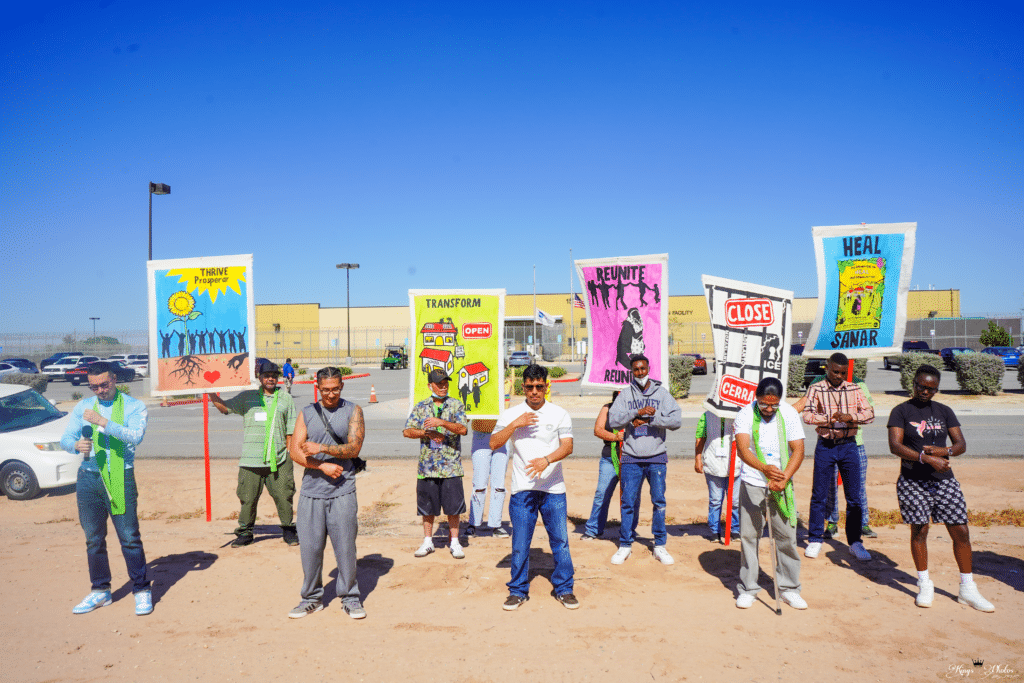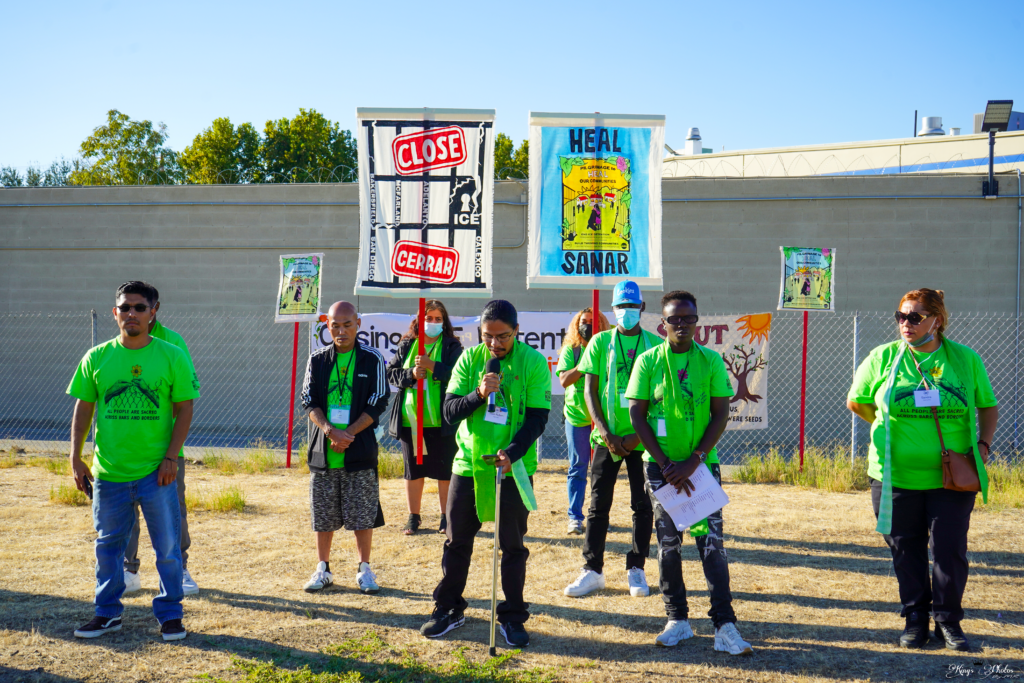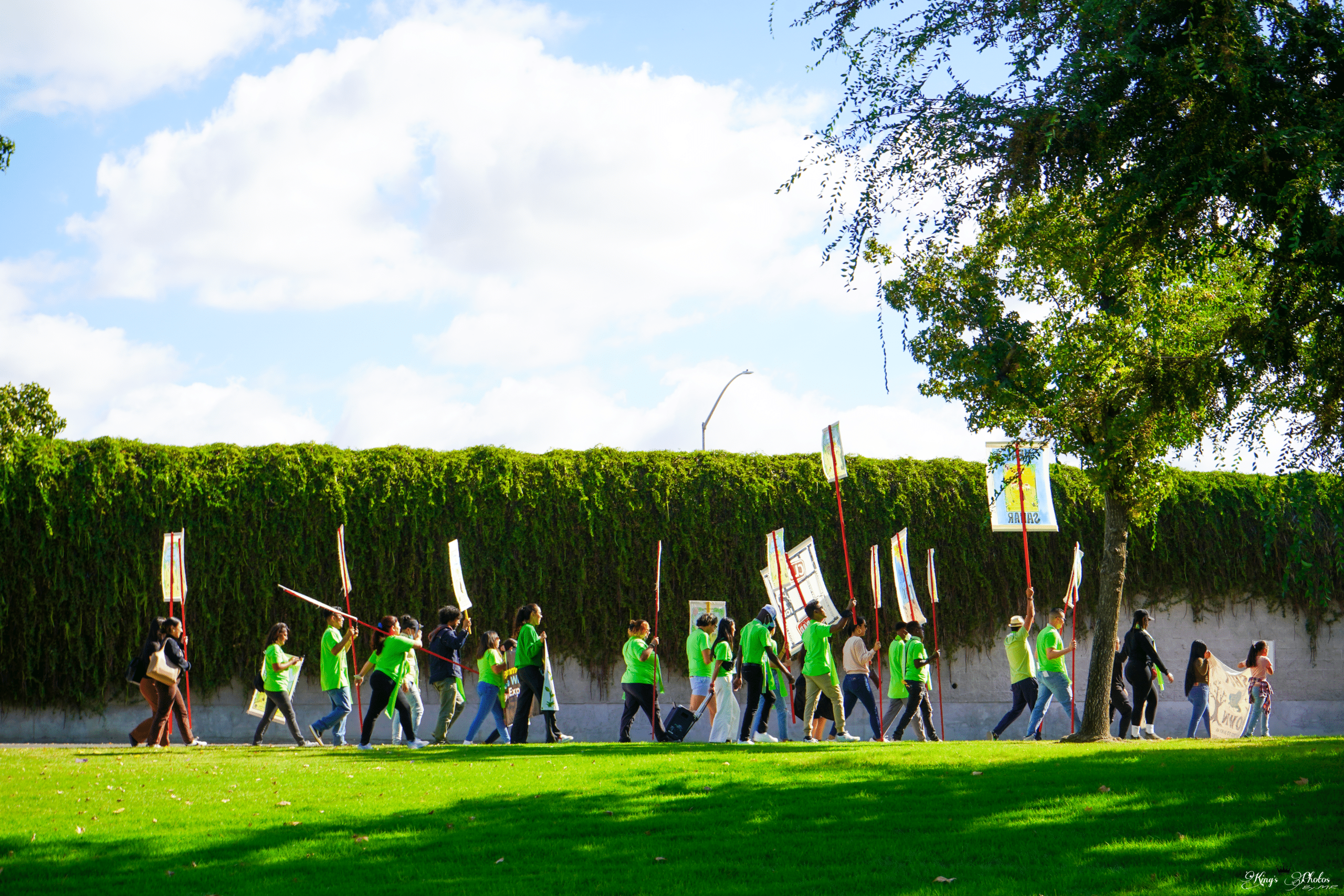Mi mayor aprendizaje a sido que juntos podemos lograr grandes cosas, atravez del apollo mutuo aprendí a desarrollar destrezas de expresión en mi persona.
My biggest learning has been that together we can achieve great things, and through mutual support, I learned to express myself.
–Aida, a formerly detained mother who attended the Pilgrimage to HEAL Our Communities in 2023
This month, New Breath Foundation is kicking off a three-part series focusing on our three main values: Collective Learning, Collective Healing, and Collective Liberation. For the month of March, we are uplifting our grantees who embody Collective Learning—a way that groups can share, study, and reflect on lived experiences and resources together. We’ve invited Rev. Deborah Lee of Interfaith Movement for Human Integrity to share how they live out Collective Learning in their work. We are grateful to Rev. Deb for her insights, leadership, and ongoing work to defend the humanity of immigrants and fight for the rights of incarcerated people.
For over a decade, the Interfaith Movement for Human Integrity (IM4HI) has conducted pilgrimages as a learning methodology to deepen our understanding of the systems we seek to transform—namely, the immigration and carceral systems, which systematically exclude and criminalize people of color. As an organization that promotes the dignity and full inclusion of immigrants and people impacted by incarceration, pilgrimage has emerged as one of our unique contributions to the broader movement.
In contrast to traditional pilgrimages that often journey to religious sacred sites, IM4HI’s pilgrimages are rooted in a tradition of postcolonial pilgrimage. These journeys revisit and unveil sites of shadowed history. Drawing inspiration from community-led pilgrimages to Manzanar, the U.S. Civil Rights Trail, and Cesar Chavez’s United Farm Worker Pilgrimage, IM4HI has organized pilgrimages to places of suffering and hope that reconnect us with land and community, reaffirming an ongoing commitment to justice.
The pilgrimage destinations are determined by our campaigns and the issues we aim to address. We have created pilgrimages to Angel Island Immigration Detention Center, the U.S.-Mexico Border, Honduras, Allensworth, CA—the first Black town governed by and for Black people in California—and every immigration detention center across California. Since 2018, IM4HI has been part of Dignity Not Detention (DND), a statewide coalition of over 16 California organizations to fight immigrant detention at the state level. Since 2012, this coalition has helped close nine detention centers; six currently remain. Pilgrimage has become an important part of this strategy.
Collective learning through the Pilgrimage to HEAL Our Communities
In 2023, following the celebration of the closure of the Yuba County Detention Center, the “Pilgrimage to HEAL Our Communities” journeyed 480 miles from Bakersfield to Adelanto, Calexico, and San Diego, visiting the remaining six for-profit detention centers and one state prison as part of a statewide campaign for prison closure. The purpose of the pilgrimage was to bear witness, to center the experience of those currently and formerly detained, and to strengthen relationships with local organizers and communities to unite our efforts for abolition across the state. We offered prayer and ceremony in front of each detention center and listened to the stories embedded within those places, which deepened our profound connection and sense of responsibility. We deepened our collective learning, not merely through facts, but through an embodied experience: to feel the earth beneath our feet, to see the detention centers with our own eyes, to touch the fences, borders, and walls. Together we asked: how did this carceral reality come to be? Why does it still exist? How can it be transformed?

Through this pilgrimage, we learned the story of the land itself: from indigenous territory to colonization, U.S. occupation, resource extraction, militarization, and the development of California as a carceral state. One participant reflected, “My biggest learnings were how vast the harm from militarism and carceral systems is: from prisons and detention centers to humans crossing the border, to cities not having hospitals because funding goes to things like Border Patrol.”
As we interacted with members of impacted communities, we listened to their needs and dreams for their neighborhoods. We recognized the interconnectedness of the issues they were confronting, like toxic waste sites, environmental pollution, and racial health disparities, all of which are integral parts of the carceral landscape. We listened to people’s visions for transforming their communities and for a sustainable future.
Pilgrimage as an embodiment of community
Pilgrimage is a collective journey that we undertake in a multiracial, multireligious, multigenerational, and multi-status community. The Pilgrimage to HEAL Our Communities included faith leaders, community organizers, and, most importantly, 18 individuals who had been detained inside those facilities just a few months or years ago. These individuals represent the myriad of ways people end up in immigration detention: documented and undocumented individuals, asylum seekers, recent arrivals at the border, long-time residents of the U.S., and individuals with legal status who, after serving time in prison due to a conviction, are sent to ICE detention for deportation simply because they are non-citizens. Some had spent months and even years inside detention. For them, it was a sacred return, to heal from their own trauma and to speak their truth in service of those they’ve left behind bars.
When we learn and journey in community, we can go deeper and farther than we could alone. It is a learning experience that centers the experiences, knowledge, and power of those who have been detained and imprisoned. Traveling through California as a community, we had to face the reality that not everybody enjoys the same freedom of movement. Some required government permission to travel beyond 50 miles of home. Some took on the possible risk of arrest or re-detainment by the arbitrary behavior of enforcement agencies. As we approached the border area and had to cross checkpoints within the U.S. boundaries, we learned how to keep each other safe with prayer and preparation.
The pilgrimage allowed me and my family to be imperfect and still be held lovingly in community. I’m almost never in spaces with others who have committed serious crimes that harmed others where we are considered still worth fighting for. Our rights to freedom, dignity, and respect were centered without any carveouts, leaving a profound impact on me.
–Inez, a pilgrimage participant whose brother Tony is detained at Otay Mesa Detention Center after earning parole following over 30 years in prison
Traveling as a community involves active participation with each person contributing their gifts, whether it be in supporting logistics, healing, art, music, or legal or medical assistance. Through this collaborative effort, we create an experience of community and wholeness, where everyone has a role to play, supporting one another and collectively experiencing the future we aspire to build.
These pilgrimages enable us to honor and bear witness firsthand and foster deep connections and reverence for what is sacred and the shared humanity that unites us. By walking with one another, we learn from the depth of each person’s experience and form powerful and deep bonds with each other, to learn and heal together.

Pilgrimage as a practice of freedom and transformation
At the end of a pilgrimage, we return changed. Not just in our new awareness and learning but by our insights and deeper connections with one another. We realize the intricate intertwining of our humanity with the sacred spaces of suffering and humanity we encounter along our pilgrimage. We return home with a new sense of commitment for the future.
When asked what they have learned and how they are changed, one faith leader from the Central Valley commented, “Having met and walked alongside the impacted leaders, I resolve to never stop fighting. I am determined to continue finding ways to support impacted individuals and local organizers in their ongoing efforts. I now have faith that we can truly end ICE detention in California.”
Pilgrimage has been a powerful organizing and leadership development tool to build awareness, momentum, and community around the immigrant rights and anti-incarceration movements. It’s been a way for us to learn together across race, class, gender, generation, and geography. Through this process, we build solidarity and awaken transformation towards a world where no one is confined and where everyone receives the support they need.
Eladio, age 34, who experienced firsthand the horrors of immigration detention, reflected in a video he created, “The pilgrimage was a time that I could heal and bring healing to the communities around these detention centers. The point of this pilgrimage was for us to connect with each other to see that we go through the same thing, to build something, to not go through this alone…. The pilgrimage hasn’t ended for me. The journey continues.”
For more on the history of incarceration and detention centers in California:
—
Rev. Deborah Lee serves as the Executive Director of the Interfaith Movement for Human Integrity in California. For over 30 years, she has worked in popular education, organizing, and advocacy, advancing the prophetic role of faith communities in today’s social movements.
